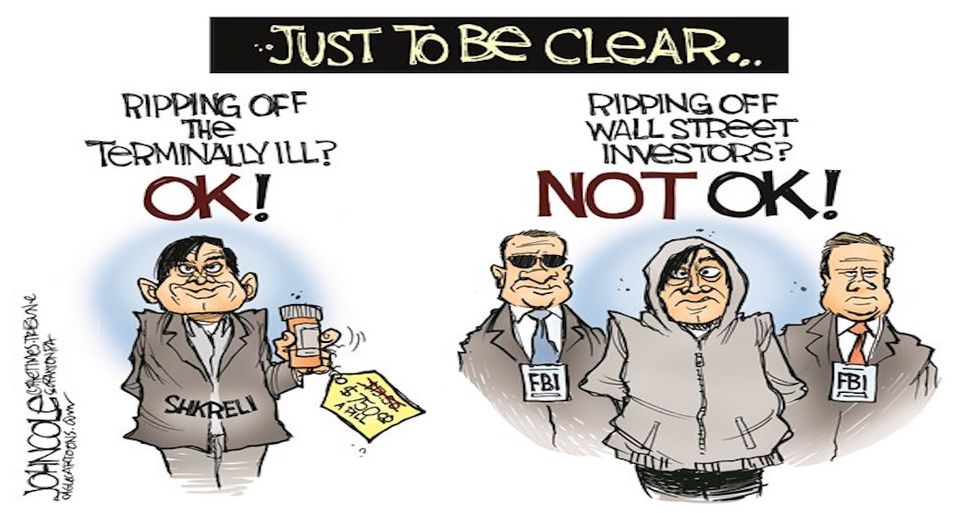In a rather strange turn of events in the realm of white-collar crime and the pharmaceutical industry, Martin Shkreli, otherwise known as "Pharma Bro" was recently found guilty of fraud. Shkreli was found guilty of both securities and wire fraud in the conclusion of a case that spanned the duration of several years. Shkreli Obtained his infamous nickname by altering the price of a life-saving drug from $13.50 to over $700 in order to maximize profits for the company. As the sole producer of this drug, Martin Shkreli controlled a monopoly on the item and as such was free to impose whatever price he wanted on the drug as the commodity is inelastic, meaning that despite price increases, consumers will still pay as much as they can in order to obtain it. It was a horrible move aimed at crippling poor and impoverished patients who could not afford the drug in order to augment profits for his company. Despite this technique being morally criticized, it is still widely pursued in today's capitalist economy in order to maximize profits and minimize costs, especially for a monopoly.
Shkreli was found guilty after mismanaging two hedge funds he owned and using a pharmaceutical company, called Retrophin, that he owned in order to pay investors of hedge funds MSMB Capital and MSMB Healthcare. These investors were defrauded and Shkreli atempted to pay them through shares of Retrophin. Shkreli also provided accounts that MSMB was making high rates of return as well as generating significant revenue when there were no funds in the hedge funds. In addition, he claimed that he used the hedge fund MSMB to provide capital to his company Retrophin, when no records showed this ever happening. Despite his investors getting paid in the end, the primary issue in this case was the fraudulent action to begin with and utilizing a public company to pay private investors of a private firm. There is an opaque conflict of interest issue that arises when debts made by a private firm are attempted to be settled by a public firm that is traded openly, which has clear risks that a private firm does not have. The overall point was that Martin Shkreli misled investors to invest in a company that underperformed expectations and expected to rectify this mistake by using a separate public entity.
This case was less about the end and more about the means to getting that end. This incident of White-Collar Crime upholds the notion that if favorable outcomes were achieved in the end then there would be no use for a strong system of law and no reason to make certain actions illegal.
Throughout the duration of the trial, Shkreli was as arrogant as usual. He would often brag about his own case and his idea of a weak prosecution. He spoke about his trial so often outside of court that Judge Matsumoto issued a court order to restrain Shkreli from commenting about the case further. At one point during the trial he began to read a book, assuming that he would be relieved and vindicated of all charges.
This case is a classic White-Collar Crime incident, however contrary to the history of WCC, this time the offender and deviant was punished for his crimes. This is a major victory in the realm of WCC. Although it does not have far-reaching applications like the Enron case and the Charles Keating case in regard to the Savings and Loans crisis of the 1980's, it seems like the arrogant Pharma Bro finally bit off more than he could handle. However, it should be noted that despite Shkreli's conviction he was not convicted of inflating the price of a life-saving drug, but rather of committing fraud against other 1 percenters. This case is a victory for WCC in firmly establishing the distinctions between public and private institutions as well as highlighting conflicts of interests, however this case also exemplifies that much of white-collar deviance that creates significant economic, social and political damages against the middle and lower classes is still not considered illegal and as such this needs to change.





 Lumiere figure at the Disney Store at the Ala Moana Shoppi… | Flickr
Lumiere figure at the Disney Store at the Ala Moana Shoppi… | Flickr








 StableDiffusion
StableDiffusion StableDiffusion
StableDiffusion 10. Extra BlanketsJuwenin Home 100% Cotton Knitted Throw Blanket
10. Extra BlanketsJuwenin Home 100% Cotton Knitted Throw Blanket StableDiffusion
StableDiffusion StableDiffusion
StableDiffusion File:Kishlaru familie.jpg - Wikimedia Commons
File:Kishlaru familie.jpg - Wikimedia Commons Photo by Hanna Balan on Unsplash
Photo by Hanna Balan on Unsplash StableDiffusion
StableDiffusion black blue and yellow round illustrationPhoto by
black blue and yellow round illustrationPhoto by 





 woman holding glass jar
Photo by
woman holding glass jar
Photo by 








